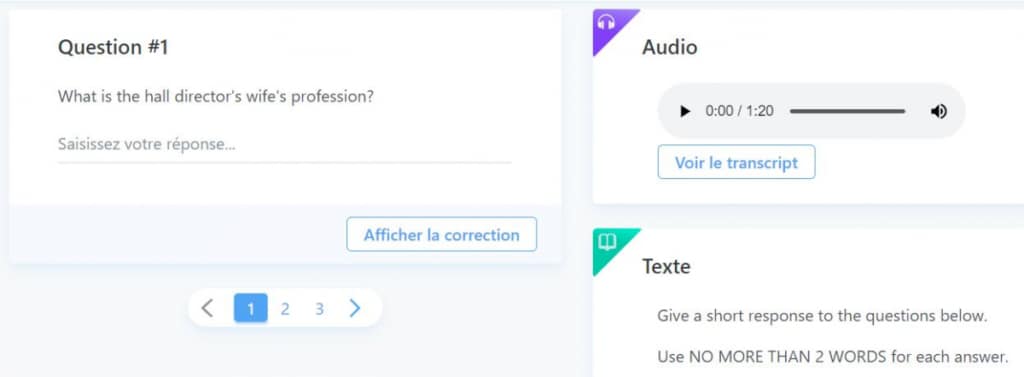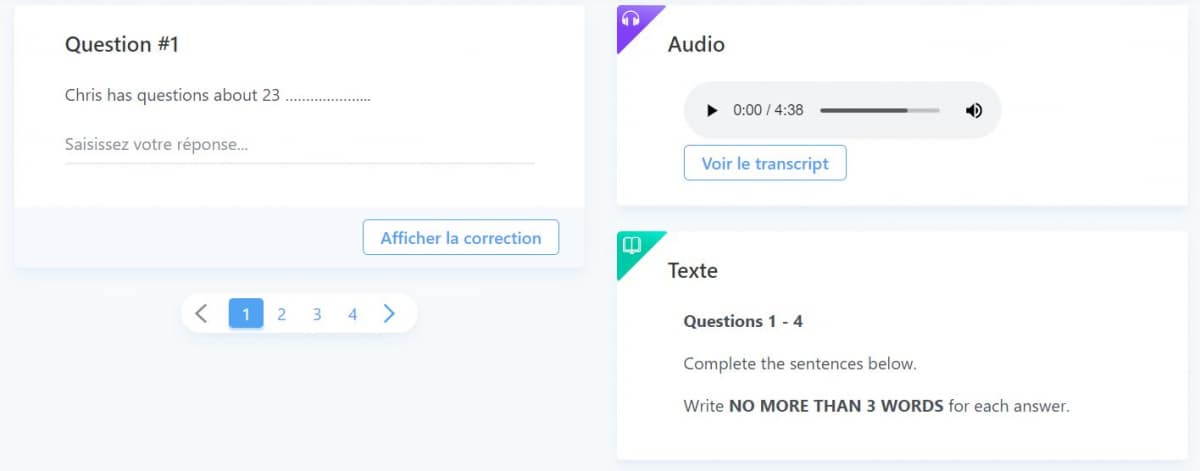There are countless IELTS Listening Tips online and in preparatory courses and loads of videos about how to boost your IELTS Listening score. Succeeding in this section is key if you plan to send your score to US universities and apply.
In this article, we will go over the following points:
- Give you an overview of what to expect in the IELTS Listening section
- Cut through the superfluous tips you should already know
- Run down our picks for how to best prepare for the IELTS Listening section with 10 easy tips.
Try them as you take one or several mock IELTS tests and in no time, you’ll be an ace at listening for the IELTS test! Let’s get started.
What Is The IELTS Listening Section Format And Timing?
The Listening portion of the IELTS comes in four parts. Each part deals with a different subject and they get increasingly difficult as they progress.
- Social context (2 speakers): The first audio is generally an informal dialog in a social situation. It might be about sending a package at a post office or someone asking about enrolling in a class.
- Social context (1 speaker): The second audio usually comes in the form of a monolog. It might be someone speaking to a group of tourists on a tour or information on a museum exhibit.
- Academic context (2-4 speakers): The third audio is a conversation between a small group of people discussing academic matters. This may include a discussion surrounding a group project or assignment involving students and a teacher, for instance.
- Academic context (1 speaker): Finally, you’ll hear a university lecture in the fourth audio. You’ll surely find this to be the most difficult audio to follow along as it could relate to any academic topic imaginable.
You don’t necessarily need any specialized knowledge in the academic field as all answers requested will be provided to you in the audio recordings.
The entire Listening exam lasts 40 minutes: 30 minutes of listening and 10 minutes to allow you to answer the different question type. There are 40 questions in all.
IELTS Listening Sample Exercises And Instructions
Sample exercises are here to help you train as if you were already taking the IELTS exam. These are some type questions that you may encounter. It is time to practice for your exam.
Exercise 1:
As an example, on the GlobalExam platform, you will hear a conversation of about 5 minutes and you will have to answer 10 questions. Remember that you can only listen to the tape once and that you will have to follow the instructions scrupulously. Therefore, start by reading the questions and what is required:

Exercise 2:
On GlobalExam platform you will have to answer 10 comprehension questions writing 1 to 3 words maximum from a 5 to 7 minute recording on a general topic in an English-speaking country. On the day of your test, you will only be able to listen to the audios once. Therefore, you should get used to “British” expressions and accents. Although IELTS brings together different accents of native English speakers (e.g. Canadian, Australian), the main accent remains British, as does the vocabulary used.
Understanding “British” expressions and accents could be a challenge because the pronunciation is complex. Depending on the sound a word is spoken, it could have different meanings. Fast speech on top of it does not make the task easier therefore training your ear becomes a must do.

Exercise 3:
In this example, you will hear a conversation between 2 and 4 people in an academic context. The recording will last between 5 and 7 minutes and you will answer 10 comprehension questions. The recording is available for your listening only once. Remember that spelling counts in the grading system.
A short spelling practice can be useful as this exercise requires you to write the missing words correctly. In this case, have the habit to take essential notes and concentrate on what people are saying during their conversation and not how they say things. There is no need to write down complete sentences, you will not have enough time and it is not necessary. Focus on important information listed as bullet points, keywords or abbreviates.

Our Tips To Ace The IELTS Listening Section At Your Exam
Let’s take a look at 10 great tips you can apply as you train for the IELTS Listening test:
Tip #1: Read The Questions Carefully.
Some time is allowed to read the questions before the recording is played back. Thoroughly reading and understanding the question before you listen will guide your listening and help you focus on only the information you need even before the recording starts! Because we love sharing, we have also written an article on reading tips for IELTS and how to prepare for this section.
Tip #2: Read Two Questions At Once.
You might find that if you read only one question, you’ll miss hearing key information needed for the following question. Multitasking is key to succeed in this section.
Tip #3: Write Your Answers In Your Test Booklet, Then Copy Them To Your Answer Sheet At The End.
As you are listening, jot down your answers in your test booklet. You will then be given 10 minutes to transfer these answers to your answer sheet. This is when you should verify your spelling and grammar. It is important to be curious and want to know how to ace the IELTS Writing section with tips. And above all, make sure your answers sheet is complete, which brings us to…
Tip #4: Don’t Leave Any Blank Answers.
You are not penalized for wrong answers with negative marks, but instead will simply earn a 0. Therefore, you don’t risk anything worse than a 0 if you put any answer down, even if you’re not sure about it. Therefore, it is better to write an answer than leaving the space blank.
Tip #5: Don’t Worry If You Don’t Catch Everything You Hear.
Remember, you’ve read the question fully beforehand, so you know in advance what keywords and information you need to focus on.
Tip #6: Don’t Worry If You Miss One Question.
The entire Listening section is timed, so don’t worry too much if you miss one question as you risk missing important information for the next question. Remember to stay calm and continue focusing.
Tip #7: Pay Attention To The Word Count In The Instructions.
If the question states that you need to provide exactly no more than one word, and you write “the school” instead of “school,” your answer will be marked wrong. In this case, remember that counting counts in the test score.
Tip #8: Don’t Underestimate The Importance Of Synonyms.
As with many language tests, the IELTS requires you to demonstrate that you understand and can use synonyms. Questions are often paraphrased or use synonyms to the keywords spoken in the recording, so be sure you have full mastery of vocabulary useful for the IELTS. Practice your the Speaking part with tips to ace this section.
Tip #9: Always Double-Check Your Answers to Questions.
Verify, re-verify, and re-re-verify that the answers you transfer to your answer sheet match those in your test booklet.
Tip #10: Practice, Practice, Practice.
You are still wondering why you should prepare for the IELTS? Preparation is key and training with GlobalExam can help you. You’ll find lots of practice audio files for the IELTS on a variety of topics and with lots of different speakers and accents that match the testing conditions exactly. At GlobalExam, we give you the training you need for both versions of the test, IELTS Academic and IELTS General. There are only a few IELTS steps to success and you are clearly on the road to it!

Some Tips To Improve Your Listening Comprehension
Start step by step by listening to content you know you can understand. Then increase the level of difficulty in terms of sentences, accent, vocabulary, grammar… If you try to listen to something too high level from the very beginning, you will quickly get discouraged.
Try not to focus on every word but more on what the main topic of what you’re listening is : this way your brain won’t be confused and won’t lose time focusing on small details.
When training, listen again and again to the same audio. Start with some pauses the first and second time during it if you need time to process, then once you understand the subject, listen to it from the beginning to the end straight. You will be encouraged not to rely on any break, which you won’t have during the real exam. It is always a great thing to Challenge yourself.
You should take the habit of taking notes. It might seem distracting at first but it will train your mind more than you can imagine. As soon as you hear something that feels relevant for the understanding of the listening exercises, write it down, even if it’s just one word. At the end of the exercise, you must be able to compile all these words together and explain what the subject is all about, just by reading them. Do not try to keep all the information in your head because you will quickly get confused.
The Best Advice We Can Give You: Train With Us Online
At GlobalExam, we want to help you succeed at your exam. If you want to practice with us for the IELTS, we offer you a training composed of :
- Practice tests to evaluate yourself in real conditions and find out your score;
- Corrected exercises to train, learn from your mistakes and improve quickly;
- Personalized courses to choose what suits your goal and to stay motivated;
- A progress tracker.
On our e-learning platform, all content is produced by competent teachers and experts in language teaching. These rich and varied contents allow you to understand in depth the structure of the exercises as well the test in general.
On GlobalExam, you also have access to your answers and your progress statistics. These decisive tools for positive development allow you to monitor your day-to-day progress and identify possible areas for further study to maximize your chances of success at IELTS.



